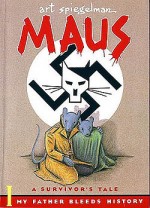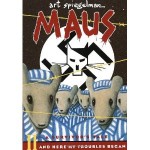

By Art Spiegelman (Pantheon/Penguin)
ISBN: 978-0-14017-315-4 & 978-0-14013-206-9
Also available as: Complete Maus: A Survivors Tale
ISBN: 978-0141014081
During the 1980s, English-language comics finally began to be accepted by the wider world and that’s in no small part due to the groundbreaking success of an independent funny-animal comic for adults which quite rightly took the world by storm.
Most of you will probably have read this incredible tale already – and if you have feel free to skip the following tirade – but on the rare chance that you haven’t but are still open to persuasion I offer these thoughts…
Art Spiegelman first began his exploration into his family’s history in 1972 when he created a short strip for the Underground anthology Short Order Comix, in which he first examined his own reactions and response to his mother’s suicide in 1968. That tale led to a desire to understand his extremely difficult father Vladek and a determination to turn his recollections and experiences as a Holocaust survivor into a series of strips.
The individual chapters of what would become Maus began appearing at the end of the decade as monochrome mini-comic inserts in Spiegelman’s experimental and increasingly prestigious art-house anthology Raw! with the first collected edition of the scratchy, primally evocative chapters released in 1986 and a concluding volume published in 1991.
This is a graphic masterwork everybody should read and I’m hesitant to give too much away in a review, but in the hope of enticing any new readers or late hold-outs here are the bare bones…
My Father Bleeds History introduces the young Spiegelman and his father Vladek in 1958, in the sparse and primitive anthropomorphic style that did so much to rightly shade this tale as “History†and “Autobiography†rather than “Fiction†on library and bookshop shelves.
‘The Sheik’ re-introduces them both decades later.
Vladek is a crusty old kvetch even his son finds hard to deal with. The old man’s second wife Mala suffers greatly with her husband’s odd, penny-pinching, bigoted and fiercely independent ways and manners. Over an uncomfortable dinner Art convinces his dad to speak about his life during wartime…
It all began with good times in Czestochowa, a Polish city close to the German border and relates how the youthful, stylish, even rakish entrepreneur found true love whilst pursuing and winning the wealthy Anja Zylberberg, whilst ‘The Honeymoon’ detailed the frail woman’s clandestine connection to the pre-war Communists, the birth of their first child Richieu – paralleled with some poignant modern day interjections regarding Art’s own birth – and presented the first inklings of what was to come when the happy couple visited Nazi-occupied Czechoslovakia in 1938, culminating in Vladek’s being drafted into the Polish Army in August 1939…
With his contemporary home-life deteriorating and ill health overtaking him Vladek relates how he became a ‘Prisoner of War’ almost immediately after induction into the military and separated from the Christian Poles in the German POW camp. Suffering extreme hardship and particular abuse, the Jewish prisoners were offered the chance to volunteer for labour assignments in exchange for better conditions.
The job was literally moving mountains…
Whilst working for the invaders Vladek had a vision which carried him through all the horrors of the conflict, and in the short-term led to his repatriation when the German work project finished. Even with the Jewish workers dispatched back to Poland, Vladek knew the Nazis had not finished with the Jews…
By guile and sheer enterprise he made his way back to Anja and Richieu in Sosnowiec and began a brief career on the wrong side of the law as new rules and old prejudices made life increasingly difficult for Jewish citizens…
In 1941 ‘The Noose Tightens’ with his friends and acquaintances enduring increasing hardship but still refusing to see the way the winds were blowing. Vladek carried on ducking and diving to keep his family alive, but the occupiers were becoming ever bolder and entire enclaves of Jews were being transported on the flimsiest pretexts. The Spiegelman’s were compelled to give Richieu away to keep him safe. Now Vladek was a full-time trader of illegal and contraband goods, constantly risking his life. Even with the transportations gathering pace most Jews believed they were merely being deported or exiled, but Vladek began preparing a hiding place for the family: a bunker to live out the war. In August 1942 a mass “passport inspection†in Sosnowiec practically emptied the town of Jews – an event for which Spiegelman’s step-mother Mala offered her own participant survivor’s perspective…
‘Mouse Holes’ opens with Art having to referee Vladek and Mala’s latest confrontation and incorporates the 1972 prologue strip ‘Prisoner on the Hell Planet’ which depicted the events following Anja’s suicide in 1968. When Vladek reads the strip it prompts him to a new level of revelation…
In 1943 the final round-up of Polish Jews began and with daily atrocities mounting, the family fostering Richieu chose death rather than the camps. Vladek and Anja took to their bunker with their remaining friends but after torturous weeks they too were captured leaving the couple alone, desperate and hunted…
The first volume concludes with ‘Mouse Trap’ as in the present day Vladek and Mala’s relationship deteriorates even further with Art caught impossibly in the middle – leading the embittered and belligerent old man to finally disclose how he and Anja were caught masquerading as non-Jews and sold to the Nazis by gangsters…
In March 1944 they were sent to Auschwitz and separated…
The second volume And Here My Troubles Began (From Mauschwitz to the Catskills and Beyond) concentrates equally between Vladek’s memories and his catastrophic present-day (1979) relationship with second wife Mala, beginning with ‘Mauschwitz’ as Art was dragged to the Catskills after Vladek faked a heart attack. In truth the crisis was that Mala has left him and emptied one of his bank accounts…
After much acrimony and acting out Vladek buys his son’s attention and goodwill by revealing how life in Auschwitz worked and how even in the worst of all possible situations, a smart operator could soften the pain and even perhaps profit whilst surviving…
‘Auschwitz (Time Flies)’ creatively jumps to recount Vladek’s death in 1982 and the reaction to the public sensation which followed the release of the first volume, before returning to the death-camp where Vladek discovered that an adjoining camp – Auschwitz II/Birkenau – held women prisoners and that Anja was still alive…
Exerting all his wiles and scams Vladek manages to get himself assigned there as a repairman and is reunited – albeit through barbed wire – with his wife. Meanwhile all around them, the Nazis were frantically exercising their horrific “Final Solutionâ€â€¦
With Vladek quickly driving Art and his wife Françoise crazy ‘…And Here My Troubles Began…’ simultaneously explores the ongoing father-son relationship as the old man gradually describes the last days of the death-camp, with daily privation constantly punctuated by the rapidly approaching sound of Allied artillery getting ever closer.
The terrified guards moved the prisoners in ghastly forced marches into Germany and a new camp where the worst atrocities occurred after the survivors were forced onto packed cattle-trains as the Jew were moved towards their final fate in Dachau…
Enduring, brutality, betrayal and disease the prisoners waited for the inevitable end but inexplicably found themselves again herded onto trains and shuttled towards Switzerland…
‘Saved’ sees the bewildering old man at his anti-social worst whilst describing how they were released near the border, in an exchange for German POWs, only to suffer one final betrayal before being found by American soldiers…
Free and safe, Vladek shares with his son intimate details of the friends and family forever lost before the final chapter ‘The Second Honeymoon’ begins months later with a frantic call from Mala. She and Vladek had reconciled in Florida but now he was sick again and had discharged himself from hospital, determined to be treated in New York. Art reluctantly travels South to accompany his father and learns of the immediate post-war years when the last survivors travelled to Sweden and settled there, once again depending on his guile and ability to make deals to thrive.
Eventually Vladek and Anja obtained visas for America and emigrated…
From his sickbed the tired survivor at last reveals the magical events of the immediate post-war days. Of life in a Displaced Persons camp, relapsing into typhus, contracting diabetes and being assigned to work details rebuilding Germany, ending with his journey back to Sosnowiec where Anja, having consulted a Gypsy fortune teller, was waiting…
Maus is a fabulous, horrible, poignant and captivating examination of not just the most appalling moments of modern history and worst examples of human depravity but also how tribulation shapes and recasts survivors: not merely a brilliant comic story but a magnificent example of narrative as history. It a tale no one should be unfamiliar with.
© 1973, 1980, 1981, 1982, 1983, 1984, 1985, 1986 Art Spiegelman. All rights reserved.
